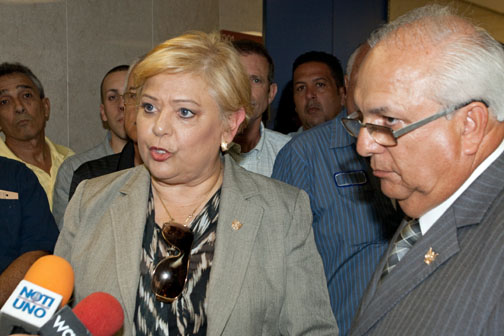P.R. entrepreneurs present econ. development proposals

Empresarios por Puerto Rico, a multi-sectoral organization that groups local-capital companies, presented specific economic development proposals to the Congressional Task Force on Economic Growth in Puerto Rico aimed to incentivize the island’s fiscal panorama.
For each of the proposals, the group presents an analysis of the positive impact for both the Puerto Rican and U.S. mainland economies.
“They are well-researched, feasible and appropriate proposals for all parties if what the federal government is pursuing is to reactivate Puerto Rico’s economy as soon as possible,” said Elliot Pacheco, vice president of the organization, who headed the mission to the federal capital.
Among the strategies presented, Pacheco said increase from 20 to 30 the number of working hours for an employee to continue benefiting from Welfare and federal housing. This proposal would generate an additional income of $544 million for the federal government and $1.7 billion for the local economy, and zero expense for U.S. taxpayers, the group said.
“You can not develop the economy if you don’t increase the formal labor force rate, which is why the work compensation package work must be greater than the social welfare package,” said Enid Monge-Pastrana, president of Empresarios por Puerto Rico.
In addition, the organization asked that entry requirements for international tourists and students are relaxed, as he was granted the U.S. territory of Guam. This proposal, combined with the internationalization of local universities could attract between 500,000 and a million annual visitors and, therefore, would have an impact of $1 billion for Puerto Rico and about $400 million of revenue to the United States.
“We went to negotiate and establish positive results for both parties, ” said Pacheco, who mentioned that the group also joined the claims for parity in Medicaid and Medicare funds, especially the “Low Income Subsidy.”
The second proposal is removing navigation acts, a regulation disliked by the vast majority, including some labor unions, the group said.
Removing these navigation acts do not cost anything for U.S. taxpayers, increases imports from the U.S. [by the price effect] and reduces the cost of living in Puerto Rico, therefore, reducing the current 46 percent poverty rate mentioned in the Puerto Rico Oversight, Management and Economic Stability Act that created the Task Force, the group said.
The economic impact for the U.S. economy would be $300 million, while it would inject $426 million into the island’s economy, according to the study.
These proposals are a “perfect complement” to those presented by the Private Sector Coalition.
“Without economic development, Puerto Rico will suffer the consequences of fiscal austerity policies. Migration, losses in the tax base and investor uncertainty will increase,” Monge de Pastrana said.
“Therefore, we’re committed to the initiatives that Puerto Rican companies committed to the island have presented,” she said, sending a nod to Supermercados Selectos for commissioning the economic study used to prepare the proposals.
Empresarios por Puerto Rico, founded in 2013, brings together several local products and services providers from a wide range of sectors including community pharmacies, hardware stores, supermarket chains, cooperatives, wholesalers, florists, professional associations, among others. Together, its members employ more than 50,000 people and generate about $6 billion for the Puerto Rican economy.
The Congressional Task Force on Economic Growth in Puerto Rico will be receiving proposals through Oct. 14.













